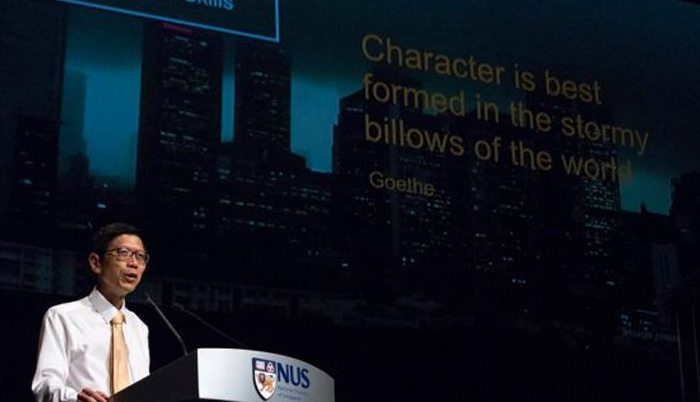![]() Home > Singapore
Home > Singapore
Telcos Pony Up Record S$1.14b For Spectrum Rights

Stiff competition means they are unlikely to pass on higher costs to consumers, say analysts
![]() April 5th, 2017 | 08:18 AM |
April 5th, 2017 | 08:18 AM | ![]() 1344 views
1344 views
SINGAPORE
Telecommunications companies here paid a record sum of S$1.14 billion to get spectrum rights for their 4G services and upcoming mobile services such as 5G and Internet of Things (IoT). The incumbents were quick to point to the entry of a fourth telco as one of the factors that pushed their combined outlay beyond the billion-dollar mark for the first time.
At the previous auction in 2013 involving the three incumbent telcos, Singtel, M1 and StarHub, the combined outlay was S$260 million.
Australia-based TPG Telecom, which won the right to be Singapore’s fourth telco last December, joined the latest spectrum auction held yesterday by the Info-communications Media Development Authority (IMDA).
Up for bidding was 175MHz of spectrum, and Singtel secured the lion’s share of 75MHz at a price of S$563.7 million. StarHub took 60MHz for S$349.6 million, while M1 spent S$208 million for 30MHz.
TPG paid S$23.8 million for an extra 10MHz of spectrum, adding to the 60MHz it already won at last December’s new entrant spectrum auction.
The telcos use the spectrum for data services, and this round of auction covered the 700MHz, 900MHz and 2.5 GHz spectrum bands.
The results are a far cry from the last auction for 4G services, when the three incumbent telcos paid between S$40 million and S$80 million each for spectrum, albeit for the 1,800MHz and the 2.5MHz bands.
Addressing this, the telcos said that the intense bidding yesterday drove up prices. StarHub’s chief executive officer Tan Tong Hai said that the spectrum came at a “significantly higher cost than previous auctions, due to the participation of an additional bidder which led to intense competition among the bidders”, referring to TPG.
Still, he was “pleased” that StarHub secured the spectrum needed to deliver “quality mobile services to our customers and to facilitate our roadmap towards 5G”.
M1’s chief technical officer Denis Seek similarly noted that there was “aggressive bidding” for the available spectrum.
M1 will use this to enhance 4G coverage, while Singtel spectrum’s will go towards new technologies.
Mr Yuen Kuan Moon, chief executive officer of Singtel’s Consumer Singapore unit, said: “As the 700MHz spectrum band is the most efficient and versatile spectrum band for LTE networks, this investment puts us in a strong position to support the growth of IoT and 5G initiatives in the future.”
TPG could not be reached for comments by press time.
In a paper published by the GSM Association — which represents the interests of nearly 800 mobile providers worldwide — a study of several countries showed that there was a link between high spectrum prices and higher consumer prices for mobile broadband data. The paper studied 325 spectrum band releases across 60 countries from 2000 to 2016 and found that over the last eight years, reserve prices and “price outcomes” have been trending upwards.
However, analysts told TODAY that due to the increased competition from the fourth telco, the other three are unlikely to pass on the higher costs to consumers.
Mr Shiv Putcha, associate director of Asia-Pacific consumer mobility and telco strategy at research firm IDC, said: “The new entrant is likely to take a price differentiation strategy or bundle heavily, so it will be more competitive and will leave the incumbents less room to manoeuvre.”
Mr Clement Teo, principal analyst at research firm Ovum, also said that the telcos would keep prices competitive: “The competition is around, providing a better service, which means the telcos’ focus will be on customer retention rather than acquisition.”
Source:
courtesy of TODAY
by TAN WEIZHEN
If you have any stories or news that you would like to share with the global online community, please feel free to share it with us by contacting us directly at [email protected]